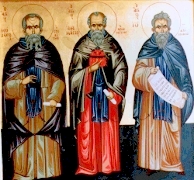Lectio Divina as School of Prayer
4. Scripture as the sole “Rule” of the monk
To a group of brothers who asked Antony for a “word” he replied: “You have heard the Scriptures? they will do very well for you”. (Note the word: “heard” – èkousate) (Ant. 19).
Someone else asked Antony:
“What must I do in order to please God?” The old man replied: “Pay attention to what I advise you: wherever you go, always have God before your eyes; whatever you do, do it according to the testimony of the Scriptures.” (Ant. 3).
Let us notice at once three things in this brief apophthegm. First of all, the monk who questions Antony is not seeking a theoretical or abstract teaching. His request, like that of the rich young man of the Gospel, is very concrete. “What must I do?” -“What must I do in order to please God?” (This is an attitude, moreover, that is found constantly in the apophthegmata). Antony’s response is two-fold. One pleases God if one has God always before one’s eyes, that is to  say, if one lives constantly in the presence of God – which is the concept the Fathers of the Desert have of continual prayer; and this is possible if one allows oneself to be guided by the Scriptures. Antony is not speaking here of reading or meditating on the Scriptures, but of truly doing everything according to the testimony of the Scriptures.
say, if one lives constantly in the presence of God – which is the concept the Fathers of the Desert have of continual prayer; and this is possible if one allows oneself to be guided by the Scriptures. Antony is not speaking here of reading or meditating on the Scriptures, but of truly doing everything according to the testimony of the Scriptures.
One day, Theodore, the favorite disciple of Pachomius, asked the latter, with the fervour of a neophyte, how many days one ought to remain without eating during The Pasch, that is to say during Holy Week. (The rule of the Church and the general custom was to observe a complete fast during the Friday and Saturday of Easter; but there were some who went for three or four days without eating.) Pachomius advised him to keep to the Rule of the Church, which demanded a total fast during the two days only, in order, said he, to have the strength to accomplish without weakening the things that are commanded us in the Scriptures: unceasing prayer, vigils, reciting the law of God and manual labour.
What is above all important for the Fathers of the Desert, is not to read the Bible, but to live it. Obviously, in order to live it one must know it. And like all Christians, the monk learned the Scriptures in the first place by hearing them proclaimed in the liturgical assembly. He also learned by heart the important parts of Scripture in order to be able to ruminate them all day long. Finally, certain ones had access to manuscripts of the Scriptures and were able to read them privately. This private reading was merely one form among others, and not necessarily the most important, of allowing oneself to be constantly challenged by the word of God.

Leave a Reply